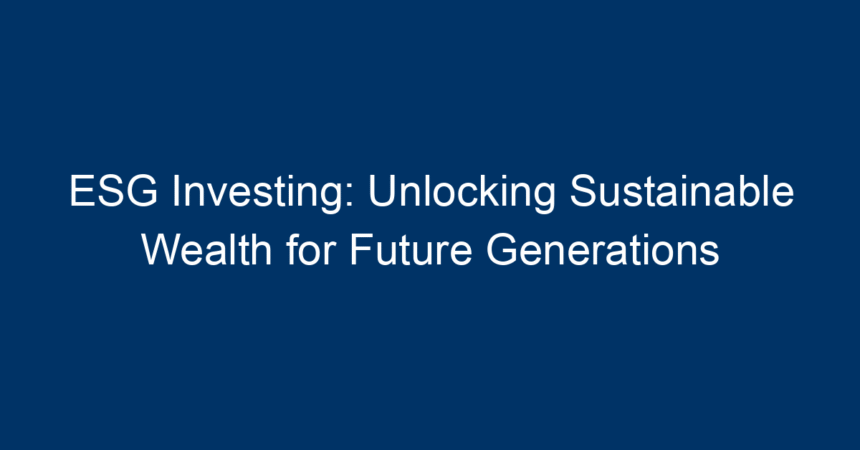In recent years, the world has witnessed an unprecedented shift in how investors approach their portfolios. The traditional focus on financial returns is increasingly being matched by a commitment to environmental, social, and governance (ESG) investing. This innovative approach not only prioritizes profit but ensures that investments contribute to positive social and environmental impact. As we strive for a sustainable future, ESG investing stands as a beacon, guiding investors toward responsible wealth creation that benefits both individuals and society at large.
Understanding ESG Investing
What is ESG?
Environmental, Social, and Governance (ESG) criteria represent a set of standards for a company’s operations that socially conscious investors use to screen potential investments.
- Environmental criteria examine how a company performs as a steward of nature. This includes factors such as carbon emissions, waste management, and resource depletion.
- Social criteria consider how it manages relationships with employees, suppliers, customers, and the communities where it operates. This encompasses labor practices, diversity, and community engagement.
- Governance criteria deal with a company’s leadership, executive pay, audits, and shareholder rights.
This framework allows investors to align their investment choices with their values, driving not only financial returns but also societal and environmental benefits.
The Rise of ESG Investing
The rise of ESG investing can be attributed to several factors:
-
Increased Awareness: As global challenges like climate change and social inequality gain more visibility, investors are seeking ways to be part of the solution.
-
Regulatory Changes: Governments worldwide are enacting policies that demand greater transparency and accountability regarding corporate behavior.
-
Market Demand: Institutional investors such as pension funds and endowments are increasingly incorporating ESG factors into their portfolios, responding to stakeholder demand.
- Performance Evidence: Numerous studies have shown that companies with strong ESG practices tend to perform better in the long run, making a compelling case for investors.
Benefits of ESG Investing
Financial Performance
One of the most significant misconceptions surrounding ESG investing is the belief that you must sacrifice returns for ethical considerations. Research consistently demonstrates that companies with robust ESG practices often outperform their peers. Investors focusing on ESG investing can potentially unlock sustainable wealth whilst also seeing positive financial returns.
Risk Management
A strong ESG profile can lead to better risk management. Companies that prioritize sustainability are often better prepared to handle environmental disasters, regulatory changes, or social upheavals. Investing in such companies also reduces reputational risk and can lead to lower volatility in market downturns.
Attracting Talent
Businesses that demonstrate a commitment to ESG principles are often more appealing to top talent. Employees today prioritize working for companies that reflect their values. This competitive advantage not only helps attract skilled workers but also increases employee engagement and retention, further benefiting the bottom line.
Challenges in ESG Investing
Lack of Standardization
The ESG investment landscape is marred by a lack of standardized metrics, making it challenging for investors to compare companies straightforwardly. With differing methodologies, two funds may both claim to incorporate ESG principles but may include vastly different companies.
Greenwashing
Some companies may exaggerate their commitment to sustainability, a practice known as greenwashing. This can mislead investors who are genuinely trying to make responsible choices. It’s crucial for investors to conduct thorough due diligence to ensure they are supporting companies with authentic ESG practices.
Short-Termism
The focus on immediate financial returns can pose a challenge in the ESG space. Many investors still operate on a short-term mindset, while sustainable investment often requires a longer time horizon to see significant results.
Strategies for Successful ESG Investing
Conduct Thorough Research
Investors should delve into a company’s ESG reports and third-party assessments. Resources like the Global Reporting Initiative (GRI) and the Sustainability Accounting Standards Board (SASB) can provide meaningful insights.
Replace Conventional Metrics
Rethink traditional investment metrics. Key performance indicators for ESG investing can include carbon intensity, gender pay gaps, or community impact. This will help create a more fruitful investment strategy aligned with ESG criteria.
Diversification
Just like traditional investing, diversification is key in ESG investing as well. By spreading investments across various sectors with solid ESG practices, you can mitigate risks while enhancing potential returns.
Navigating the Regulatory Landscape
Understanding Regulations
Investors must keep abreast of current regulations affecting ESG investing. This includes initiatives from various governments and regulatory authorities aimed at enhancing corporate accountability and transparency.
Global Trends
In Europe, the Sustainable Finance Disclosure Regulation (SFDR) aims to create a more transparent and structured investment environment regarding sustainability. Similarly, the U.S. is seeing a push for improved ESG disclosure requirements, which could shape the investment landscape in the future.
The Future of ESG Investing
The demand for sustainable investment strategies, particularly among younger generations, suggests that ESG investing is not a fleeting trend but a fundamental shift in how wealth is created and managed. As companies recognize the importance of sustainability, the implications for future generational wealth are profound.
Millennial and Gen Z Preferences
Millennials and Generation Z, who are now entering the investment sphere, are especially inclined toward ethical investing. As they accumulate wealth, their preferences will shape market trends and push companies toward more responsible practices.
Technological Innovations
Technological advancements such as artificial intelligence and big data offer exciting possibilities for ESG investing. Enhanced analytics will enable investors to assess ESG metrics more accurately and make informed decisions.
Conclusion: Actionable Insights for Future Generations
ESG investing provides a unique opportunity to harness the power of investment for the greater good. As you contemplate your investment strategy, keep the following actionable insights in mind:
-
Educate Yourself: Familiarize yourself with ESG principles and metrics. Knowledge is a powerful tool for making impactful investment decisions.
-
Engage with Financial Advisors: Work with financial professionals who understand ESG investing. They can guide you in creating a portfolio that aligns with your values and financial goals.
-
Stay Informed: Regularly update yourself on ESG trends, regulations, and research. This will empower you to adapt your strategy as needed.
- Advocate for Change: Use your voice as an investor to push companies towards better ESG practices. Attend shareholder meetings, vote on resolutions, and engage in dialogue with corporate leaders.
By integrating responsible investing into your financial strategy, you contribute not only to your wealth but to a sustainable future for all. Unlock the potential of ESG investing and create lasting wealth for generations to come.




